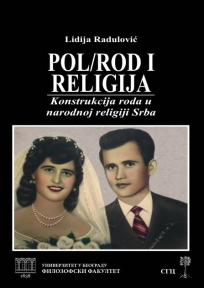Pol/rod i religija
Sex/Gender and Religion
The Construction of Gender in the Popular Religion of the Serbs
Author(s): Lidija Radulović
Subject(s): Anthropology, Social Sciences, Gender Studies, Sociology, Theology and Religion, Cultural Anthropology / Ethnology, Sociology of Religion
Published by: Srpski genealoški centar
Summary/Abstract: The study explores the social and cultural construction of gender in the traditional religion of the Serbs in the course of the 19th and the first half of the 20th century. Investigation of gender, with the anthropology of gender and the study of religion and gender as the focal points, is problematized through the key themes. Taking the perspective of gender-oriented research, the study is primarily based upon the constructionist paradigm and the various theoretical approaches in the analysis of religion. The discourse analysis, together with diverse research methods, is applied to the study of popular religion. In general, this study aims to, throughout the analysis of gender constructions in traditional culture, propose an alternative representation of the popular religion, and vice versa, to propose an alternative representation of cultural construction of gender and gender-based relations through the research of popular religion. The study also questions the theory that the popular religion of the Serbs is primarily entrenched in the principle of hierarchically organized sex/gender relations. Quite the opposite, the study suggests the principle of situational and contextual heterarchy: various dimensions and sorts of power stem from particular constructionsof religious discourses of masculine and feminine. Accordingly, through the analysis of magic and mytho-ritual spheres of popular religion, the study concludes that the absolute supremacy of men does not exist, even though religion has traditionally and ina variety of ways sustained their patriarchal role and power. The realm of sacred is actually the realm of power redistribution;therefore, it is context-sensitive and alterable. Some of the problems considered in this study are: 1) notions of femininity, masculinity, parenthood (motherhood), sexuality are the socio-cultural constructions an the patterns of their representation can be perceived in ritual-mytohological corpus of traditional culture; 2) recognizing magic as a strategy of symbolic power is relativizing representation of magic as exclusively women practice, which contributes to women subordination in particular social spheres; 3) reconsidering thesis that men control over reproduction is not absolute, furthermore, various strategies can bi noticed of women themself trying to obtain control; 4) it is shown that a consequence of collision of various masculine discourses is leading to demonization of alternative discourses.
- Page Count: 402
- Publication Year: 2009
- Language: Serbian
- Table of Content
- Sample-PDF
- eBook-PDF
- Introduction

